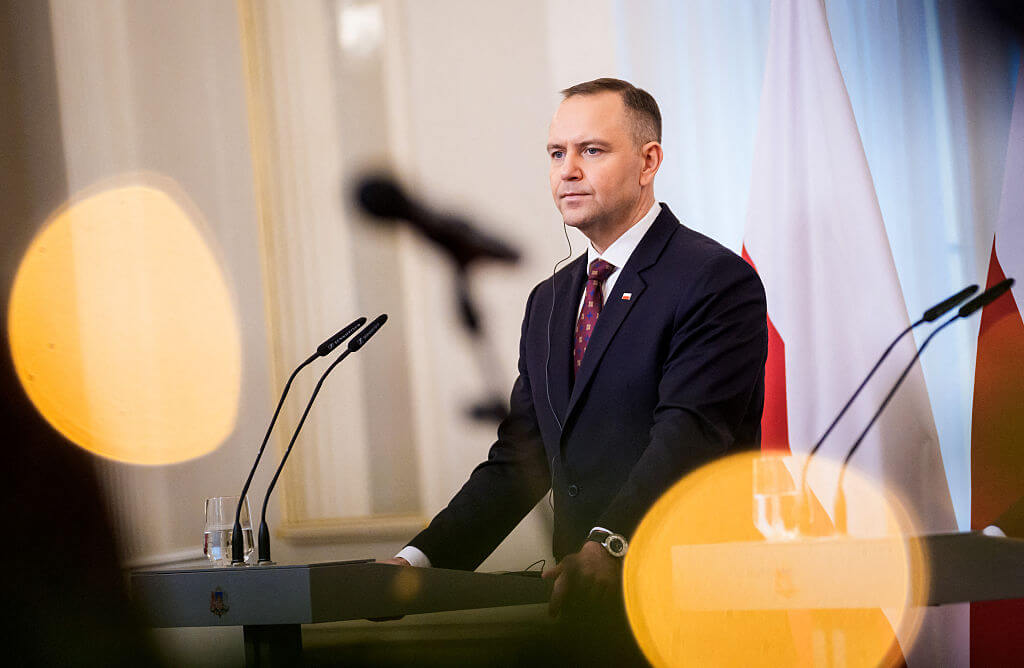Sizing Up State of Jewish People

Image by Getty Images
There are titanic, 21st century global forces confronting the entire world, but which will have unique impacts on the Jewish people, both in Israel and the Diaspora. Jews, as they have for millennia, will find a way to adapt to them. But the Jewish people face an even greater challenge, one with a less certain outcome: how to combat those internal divisions that are weakening us from the inside.
The world around us is changing in dramatic ways. There is a historic shift of power and influence from the United States and Europe, parts of the world with sizable Jewish populations and shared values, to a new grouping of multiple powers, centered in Asia and the Pacific, especially China. Because the United States has steadfastly promoted global stability, tolerance, growth and freedom, and has been Israel’s greatest champion, anything that weakens America’s influence is a threat to Israel and the Jewish people.
Globalization is another major force that could have a special impact on a Diasporic people who can be found in every corner of the world. The rapid movement of capital, technology, products and people across national borders, powered by the digital revolution, has changed every facet of our lives as profoundly as Gutenberg’s invention of the printing press did 500 years ago.
A third major force is the fierce struggle for the direction of the earth’s 1.6 billion Muslims. It is a struggle made even more critical by the Arab revolutions now dotting the Middle East, and by the persistence of a small but murderous group of Islamic terrorists threatening to destabilize moderate Muslim governments and targeting Western influence, including Jews and Israel.
All three of these global phenomena should give Jews pause, but should also not be cause for too much concern.
When it comes to the changes in how international power is distributed, Jews and Israel still have the benefit of having the world’s sole superpower at their backs. The United States remains the pre-eminent nation, a reality that will not be upended anytime soon, particularly as America looks for new revitilizing energy sources, like fracking technology, which could prove to be a game changer in the U.S.’s favor. I would not want to trade places with any other country. All the emerging giants, including China, face daunting challenges of their own.
As for globalization, it should be a major plus for the Jewish people and Israel, creating for the first time a genuinely interdependent world in which Israel is deeply embedded. Success in the 21st century requires ingredients built into the DNA of the Jewish people: education, creativity, adaptability and entrepreneurial skills.
Even when it comes to the Muslim world’s problems, all is not lost. Saudi Arabia and the Gulf States are slowly implementing reforms and share many strategic interests with the United States and Israel. The new Arab governments in Egypt, Libya and Tunisia were elected not to impose fundamentalist Sharia law, but to provide noncorrupt governance and to deliver social services, jobs and economic opportunities; this will be their focus. The peace treaties with Egypt and Jordan will survive. Especially since these Arab countries desperately need the economic support of the United States, and Europe, and of Washington-based multilateral institutions, like the International Monetary Fund and World Bank.
The most threatening global force for Israel and the Jewish people is Iran, both through its support for terrorist groups like Hamas and Hezbollah and because of its nuclear ambitions. While both Israel and the United States share the same goal of preventing Iran from acquiring a nuclear weapon, the two allies have different timetables, military capabilities and red lines for a diplomatic settlement. Israel has a narrow window for military action, while the United States can wait longer and has more powerful weapons to attack Iran’s nuclear sites. But for Israel to forestall its own attack, it must have trust that if sanctions and diplomacy fail to stop Iran’s march to a nuclear weapon, the United States will act with all its force to destroy the Iranian nuclear menace. I believe the United States will do so, and it would be far better for any military action to be taken by the United States than by Israel.
Yet with all these challenges, the ones with the greatest chance of weakening the Jewish people are internal.
The American Jewish community of just over 6 million is like an enterprise with two roughly equal divisions. One division consists of people who are vibrant, healthy, engaged and determined to assert their Judaism and pass it along to their children, with more than 750 full-time Orthodox, Conservative and Reform Jewish day schools educating 200,000 Jewish youth a year. The other is near bankruptcy and is threatening the health of the entire community. Half of all new Jewish marriages are intermarriages and only a small percentage of those non-Jewish spouses convert to Judaism. Membership in Jewish institutions and philanthropy to them is dropping. Birth rates are below replacement levels. European Jews face even more daunting demographic realities, with declining Jewish and soaring Muslim populations. Diaspora Jews have a smorgasbord of lifestyle options; every young Jew will be a Jew by choice, if a Jew at all.
This demands an urgent call to arms. Non-Orthodox rabbis should perform intermarriages if the couple pledges to raise their kids as Jews; community institutions should openly welcome intermarried couples. Jewish education must be given top priority and made more affordable by creating a massive Jewish education endowment fund. The philanthropic effort known as Birthright Israel, which has taken more than 250,000 young Jewish adults to Israel, creating deeper Jewish identification, should be given more support by the Israeli government.
Israel faces its own internal challenges. While the Jewish population of Israel has a healthy birth rate, it is still lower than those of Israeli Arabs and Palestinians. It is unsustainable for a nation of 5.8 million Jews to control the lives of more than 2 million Palestinians in the West Bank against their will. A separation into two states, with strong security guarantees for Israel, is not a gift to the Palestinians; it is an imperative to maintain a democratic, majority Jewish state. And if there is no Palestinian peace partner, Israel should adopt the political version of the Hippocratic Oath: “Do no harm,” by avoiding the expansion of settlements deeper into the West Bank. The Israeli government should make bold proposals for peace, even if they continue to be rejected, so that the onus for any impasse rests on the Palestinians, not on Israel.
A grave internal threat to the rule of law comes from a small, radical, messianic group of settlers who openly defy the authority of the government, building outposts illegal under Israel’s own laws, torching mosques, burning Qurans, poisoning Palestinian olive trees and even attacking Israeli soldiers.
Today, about 50% of Israeli first-graders are either Israeli Arabs or children of Haredi families. Haredim are now about 8% of the population, but this percentage will double over the next several decades because of extraordinarily high birthrates. Since few serve in the military, and the majority is not in the workforce, there is an urgent need to incorporate them into the mainstream of Israeli life, or they will be a great drag on the Israeli economy and cohesion, particularly on Israel’s prized equality for women.
Israel faces another profound internal challenge: the need to be at peace with itself. It is also long past time for Israelis to reach a consensus on basic issues: where they want their ultimate borders to be, and what their relationship should be with their Israeli Arab citizens and the Palestinians over which they rule.
But when we consider the shattered state of world Jewry after World War II and think about how far we have come, there is reason for optimism. The empires that sought to destroy the Jewish people have vanished, but the indestructible, indomitable Jewish people have survived and still thrive, and will continue to make contributions to the world far out of proportion to our small numbers.
Stuart E. Eizenstat was chief domestic policy adviser to President Jimmy Carter, and served various senior positions in the Clinton Administration from 1993-2001. His new book discussing these challenges is “The Future of the Jews: How Global Forces are Impacting on the Jewish People, Israel and its Relationship with the United States” (Rowman & Littlefield, 2012) .















